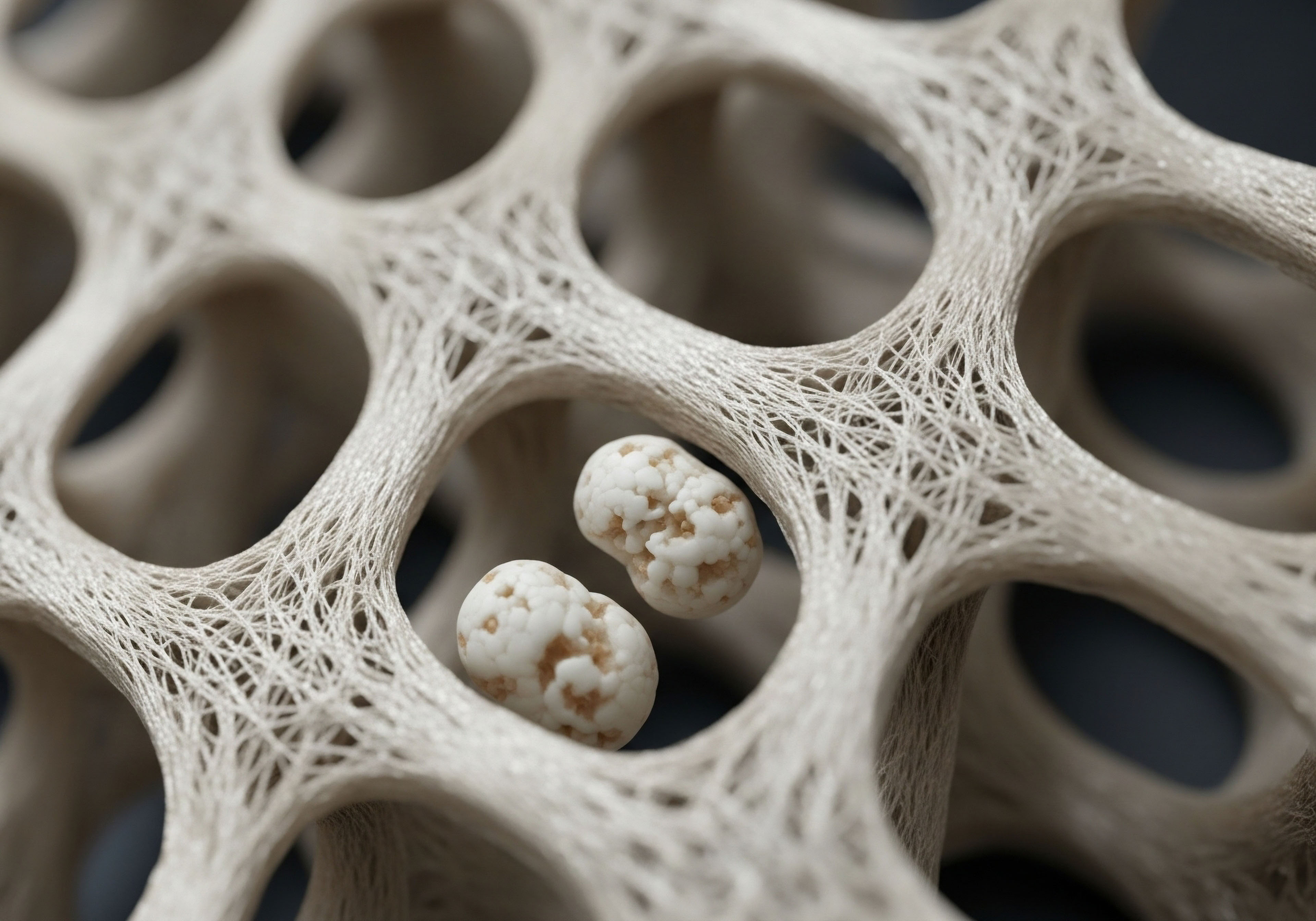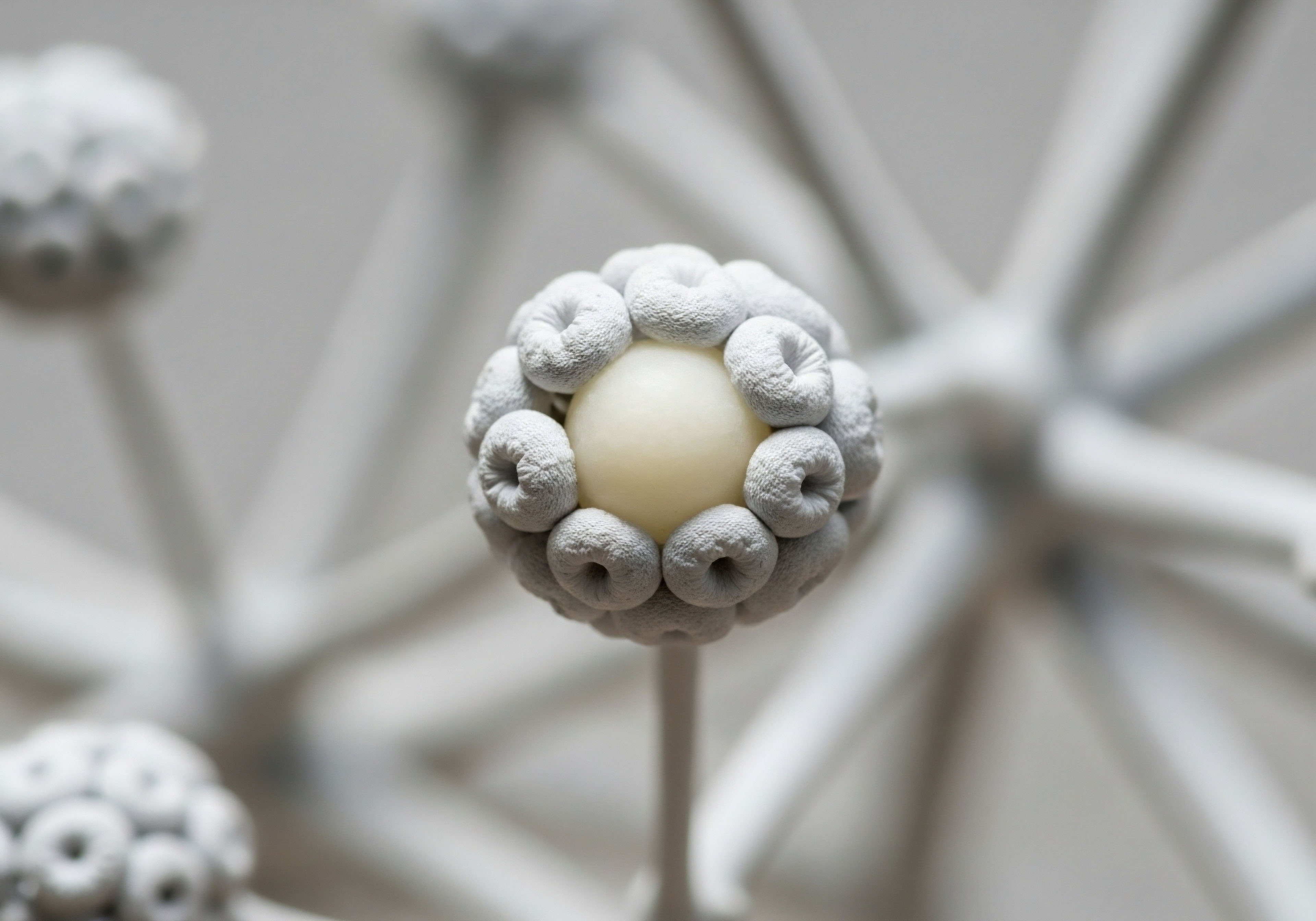

Fundamentals
When the rhythm of daily existence feels muted, and the intrinsic drive to engage with life’s demands diminishes, many individuals grapple with a profound sense of fatigue and a receding tide of motivation. This lived experience often extends beyond mere tiredness, reaching into the core of one’s ability to initiate and sustain meaningful activities, including personal wellness protocols.
A deep understanding of these subjective feelings often reveals a complex interplay of biochemical messengers within the body, particularly those orchestrated by the endocrine system. These internal signals, often taken for granted, orchestrate our vitality and cognitive sharpness.
Testosterone, a vital steroid hormone, operates as a profound orchestrator of numerous physiological processes in both men and women. Its influence extends across muscle development, bone density, and erythrocyte production, yet its impact on central nervous system function, mood regulation, and energy metabolism holds significant implications for an individual’s overall sense of well-being.
A decline in this essential hormone can manifest as a pervasive lack of energy, diminished enthusiasm, and a general disinterest in activities once found pleasurable or purposeful.
The ebb and flow of hormonal balance profoundly shapes an individual’s capacity for energy and motivation, impacting their engagement with life.
Hypogonadism, a condition characterized by insufficient testosterone production, frequently correlates with symptoms such as reduced energy levels, impaired cognitive function, and a decline in mood. These manifestations collectively undermine an individual’s capacity for sustained effort and their intrinsic drive.
Addressing this hormonal imbalance through targeted interventions can recalibrate the body’s internal systems, potentially restoring the foundational elements of vigor and mental acuity necessary for active participation in wellness initiatives. The endocrine system, a network of glands secreting hormones, precisely regulates metabolism, growth, and mood, with imbalances directly affecting mental and physical health.

How Does Testosterone Influence Daily Vigor?
Testosterone’s influence on daily vigor extends to cellular energy production and the modulation of neurotransmitter pathways. This hormone supports mitochondrial function, the powerhouses within our cells responsible for generating adenosine triphosphate (ATP), the primary energy currency of the body. Optimal mitochondrial performance translates directly into sustained physical and mental energy.
Furthermore, testosterone interacts with various neurochemical systems, including those involving dopamine and serotonin, which govern mood, reward, and motivation. A well-regulated testosterone level thus establishes a biochemical foundation for enhanced alertness and an intrinsic drive to pursue goals.
- Energy Metabolism ∞ Testosterone supports the efficiency of cellular power generation.
- Neurotransmitter Balance ∞ It modulates brain chemicals responsible for mood and reward.
- Cognitive Acuity ∞ Optimal levels contribute to improved focus and mental clarity.
- Mood Stability ∞ A balanced hormonal environment promotes emotional resilience.


Intermediate
For individuals experiencing the pervasive symptoms of low testosterone, such as chronic fatigue and reduced motivational drive, Testosterone Replacement Therapy (TRT) presents a clinically informed pathway to recalibrate endocrine function. The goal of these protocols extends beyond mere symptom management; it aims to restore a physiological state conducive to renewed vitality and an enhanced capacity for well-being. Understanding the specific components and mechanisms of TRT illuminates how these interventions work to optimize internal biochemical landscapes.
In men, standard TRT protocols often involve the administration of Testosterone Cypionate via weekly intramuscular injections. This method delivers a consistent supply of exogenous testosterone, elevating circulating levels to a healthy physiological range. Concurrently, adjunct medications are frequently integrated to mitigate potential side effects and preserve endogenous testicular function.
Gonadorelin, for instance, is administered subcutaneously multiple times per week to stimulate the hypothalamic-pituitary-gonadal (HPG) axis, thereby maintaining natural testosterone production and fertility. Anastrozole, an oral aromatase inhibitor, is also typically included to prevent the excessive conversion of testosterone into estrogen, which can lead to undesirable effects such as gynecomastia or fluid retention. Enclomiphene, another agent, supports luteinizing hormone (LH) and follicle-stimulating hormone (FSH) levels, further assisting in the preservation of testicular function.
TRT protocols precisely manage testosterone levels and mitigate potential side effects, promoting a balanced endocrine environment.
Women, too, experience significant physiological impacts from declining testosterone levels, particularly during peri- and post-menopause, manifesting as irregular cycles, mood shifts, and diminished libido. For women, hormonal optimization protocols often involve lower doses of Testosterone Cypionate, typically administered weekly via subcutaneous injection.
Progesterone is prescribed based on menopausal status, playing a crucial role in maintaining uterine health and overall hormonal balance. Pellet therapy, offering a long-acting testosterone delivery method, provides another option, with Anastrozole included when appropriate to manage estrogenic conversion. These carefully tailored approaches aim to alleviate symptoms and restore a sense of equilibrium.

How Do TRT Protocols Restore Vitality?
TRT protocols contribute to restored vitality by directly addressing the hormonal deficit, which in turn influences several interconnected physiological systems. Optimal testosterone levels enhance red blood cell production, improving oxygen transport throughout the body, a foundational element for sustained energy. Furthermore, testosterone’s role in protein synthesis supports muscle mass and strength, contributing to physical capacity and reducing fatigue.
The metabolic effects extend to glucose utilization and lipid profiles, where TRT has shown improvements in insulin sensitivity and body composition, particularly in men with metabolic syndrome or type 2 diabetes. These metabolic improvements translate into more stable energy levels and a reduced inflammatory burden, which can otherwise suppress motivation.
The restoration of testosterone to optimal levels positively influences neurochemical pathways associated with motivation and mood. Research indicates that testosterone can modulate dopamine activity, a neurotransmitter central to the brain’s reward system, thereby affecting drive and goal-directed behavior. This biochemical recalibration helps individuals experience greater emotional stability and a more positive outlook, making engagement with wellness initiatives feel less arduous and more intrinsically rewarding.
| Protocol Component | Primary Action | Impact on Energy/Motivation |
|---|---|---|
| Testosterone Cypionate (Men) | Exogenous testosterone replacement | Directly elevates systemic testosterone, improving energy and mood. |
| Gonadorelin (Men) | Maintains endogenous testosterone/fertility | Supports natural hormonal axis, contributing to overall well-being. |
| Anastrozole (Men/Women) | Blocks estrogen conversion | Mitigates estrogenic side effects, optimizing hormonal balance. |
| Testosterone Cypionate (Women) | Low-dose exogenous testosterone | Enhances mood, energy, and cognitive function. |
| Progesterone (Women) | Supports hormonal balance | Contributes to emotional stability and uterine health. |


Academic
The intricate relationship between testosterone replacement therapy and an employee’s energy and motivation for wellness initiatives extends deeply into the neuroendocrine and metabolic landscapes. A profound understanding requires moving beyond superficial correlations to explore the precise molecular and systemic recalibrations initiated by optimal testosterone levels. This exploration reveals how hormonal optimization protocols fundamentally reset the biological underpinnings of drive and sustained effort.
Testosterone, a key steroid hormone, exerts its influence through androgen receptors (AR) and estrogen receptors (ER) distributed throughout the central nervous system, including regions critical for mood, cognition, and reward circuitry. Its neurobiological impact involves the modulation of dopaminergic pathways, particularly within the nigrostriatal and mesolimbic systems.
Dopamine, a monoamine neurotransmitter, plays a central role in salience attribution, reward anticipation, and goal-directed behavior. Research indicates that testosterone can increase dopamine synthesis and release, alongside influencing the expression and sensitivity of dopamine receptors. This enhanced dopaminergic tone translates into improved motivation, a heightened sense of reward from accomplishments, and an increased willingness to exert effort, all of which directly bolster engagement with wellness initiatives.
Testosterone’s influence on dopaminergic pathways fundamentally shapes motivation and reward processing.
Beyond neurochemistry, testosterone profoundly affects metabolic function, which is inextricably linked to energy production. Testosterone deficiency correlates with increased visceral adiposity, reduced insulin sensitivity, and dyslipidemia, hallmarks of metabolic syndrome and type 2 diabetes. TRT demonstrably improves these metabolic parameters, reducing body mass index, waist circumference, and triglycerides, while enhancing lean body mass and insulin sensitivity.
These metabolic improvements are not merely statistical observations; they represent a more efficient cellular energy economy. Enhanced insulin sensitivity means cells more effectively utilize glucose for ATP production, leading to more stable energy levels throughout the day and reducing the chronic fatigue often associated with metabolic dysfunction.

How Does Testosterone Recalibrate Neurobiological Drive?
The recalibration of neurobiological drive by testosterone involves a multi-pronged mechanism. Testosterone influences the hypothalamic-pituitary-gonadal (HPG) axis, a complex feedback loop that regulates steroidogenesis. Disruptions in this axis can lead to a cascade of effects impacting overall physiological homeostasis. Furthermore, testosterone affects gene expression of proteins involved in neurotransmitter synthesis, reuptake, and receptor function.
For instance, it can upregulate tyrosine hydroxylase, the rate-limiting enzyme in dopamine synthesis, thereby increasing the availability of this crucial neurochemical. This molecular influence extends to serotonin pathways, contributing to mood stabilization and reducing symptoms of anxiety and depression often reported with low testosterone. A stable mood and reduced anxiety provide a more robust psychological platform for individuals to commit to and follow through with wellness behaviors.
The interplay between testosterone and mitochondrial biogenesis also merits attention. Testosterone has been shown to influence the expression of genes involved in mitochondrial respiration and biogenesis, leading to a greater number and efficiency of mitochondria within cells.
This cellular enhancement of energy production directly combats the pervasive fatigue often associated with hypogonadism, providing the fundamental biological energy required for physical activity and mental focus, which are critical for any successful wellness protocol. The systemic effect of improved cellular energetics, coupled with optimized neurochemical signaling, creates a synergistic environment where both the physical capacity and the psychological impetus for wellness are significantly augmented.
| Biological System | Mechanism of Action | Wellness Initiative Impact |
|---|---|---|
| Dopaminergic Pathways | Increased synthesis, release, and receptor sensitivity of dopamine. | Boosts motivation, reward-seeking behavior, and goal achievement. |
| Mitochondrial Function | Enhances biogenesis and respiratory efficiency. | Provides sustained cellular energy for physical activity and cognitive tasks. |
| Insulin Sensitivity | Improves glucose utilization and reduces insulin resistance. | Stabilizes energy levels, reduces metabolic fatigue, and supports healthy weight management. |
| Serotonergic System | Contributes to balanced serotonin levels and receptor function. | Promotes mood stability, reduces anxiety, and fosters emotional resilience. |

References
- Li, S. Y. et al. “Metabolic Effects of Testosterone Replacement Therapy in Patients with Type 2 Diabetes Mellitus or Metabolic Syndrome ∞ A Meta-Analysis.” ResearchGate, 2025.
- Li, S. Y. et al. “Efficacy and Adverse Events of Testosterone Replacement Therapy in Hypogonadal Men ∞ A Systematic Review and Meta-Analysis of Randomized, Placebo-Controlled Trials.” Oxford Academic, 2019.
- Newson, L. “The importance of testosterone for women.” Dr Louise Newson, 2024.
- Purves-Tyson, T. et al. “Testosterone Induces Molecular Changes in Dopamine Signaling Pathway Molecules in the Adolescent Male Rat Nigrostriatal Pathway.” PLOS One, 2014.
- Society for Endocrinology. “Society for Endocrinology guidelines for testosterone replacement therapy in male hypogonadism.” Clin Endocrinol (Oxf), 2022.

Reflection
The journey to reclaim one’s vitality and functional capacity often begins with a deeper inquiry into the body’s fundamental operating systems. Understanding the intricate dance of hormones, particularly testosterone, provides a lens through which to interpret those subtle yet persistent signals of diminishing energy or waning motivation.
This knowledge serves as an initial step, a guiding beacon toward recognizing that a truly personalized path to wellness necessitates an equally personalized understanding of one’s unique biological blueprint. The insights gained here empower you to engage in a dialogue with your own physiology, fostering a proactive stance in navigating your health trajectory.



